Juan-Luis Suárez
Learning in the Digital Age: AI and Creativity
By Busra Copuroglu
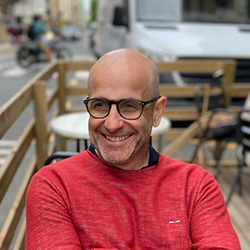 Since the launch of ChatGPT in November 2022, the academic world has been riddled with debates about its use in classrooms. While some acknowledged that using AI is an emerging skill in the twenty-first century and celebrated its arrival by adding AI Policies to their course outlines overnight to encourage students to use ChatGPT, some decried its arrival concerned with academic integrity and cheating and mourned the future death of critical thinking and (creative) writing. Recently, the science-fiction writer Ted Chiang in his essay in The New Yorker likened the kind of writing that ChatGPT generates to a “blurry JPEG”: “It retains much of the information on the Web, in the same way that a JPEG retains much of the information of a higher-resolution image, but, if you’re looking for an exact sequence of bits, you won’t find it; all you will ever get is an approximation,” he wrote.
Since the launch of ChatGPT in November 2022, the academic world has been riddled with debates about its use in classrooms. While some acknowledged that using AI is an emerging skill in the twenty-first century and celebrated its arrival by adding AI Policies to their course outlines overnight to encourage students to use ChatGPT, some decried its arrival concerned with academic integrity and cheating and mourned the future death of critical thinking and (creative) writing. Recently, the science-fiction writer Ted Chiang in his essay in The New Yorker likened the kind of writing that ChatGPT generates to a “blurry JPEG”: “It retains much of the information on the Web, in the same way that a JPEG retains much of the information of a higher-resolution image, but, if you’re looking for an exact sequence of bits, you won’t find it; all you will ever get is an approximation,” he wrote.
Is this a tool for students to cheat, merely enabling them to produce “blurry JPEGs,” or is it time to accept that learning to use AI is an emerging skill, and see this tool as an opportunity for students to become fluent in the digital world?
For Juan-Luis Suárez, professor in Digital Humanities and Director of Cultureplex Lab, ChatGPT is another digital tool in the digital age. “In universities, when something new comes, you study it, research it, pull it apart, and reach your conclusions, and that’s it. There is no more than that,” he said. In fact, CulturePlex has even launched an Artificial Intelligence Creativity Contest to encourage students to do exactly that: “it's our own way of saying use it, learn it. At least [this way], we’ll have an informed opinion about the tool. We cannot start burning people at the stake when innovation comes our way,” he added.
What interests Suárez in the use of ChatGPT is the practice of asking questions. “The best researchers are the ones that were able to ask the best questions in any discipline. Those are the ones that open new grounds, create new knowledge, and solve problems for people,” he said.
Whatever fault we may find with ChatGPT, Suárez believes, thanks to the millions of questions that people type every day in that slim rectangle box “it’s going to become very good at [catching the nuances],” because “with every question, it goes back into one of the layers of the AI –not into the content— and the system will start learning from our questions,” he explained. As well, Suárez has already integrated ChatGPT into his teaching. In one of his classes, students do research in ChatGPT. Once again, what is important for Suárez is the kind of questions that students ask. “What I want to know in class is what is it that you are asking and did your asking improve as you interacted with the machine or not,” he said.
Suárez’s plans to bring the latest digital tool is not limited to ChatGPT, however. Currently, with his lab CulturePlex, he is developing a VR & Immersive Experience project to add to the students’ learning journey at Western.
Designing Learning Experiences
Along with the tools that the digital age has to offer, creativity sits at the center of Suárez’s teaching. “Creativity is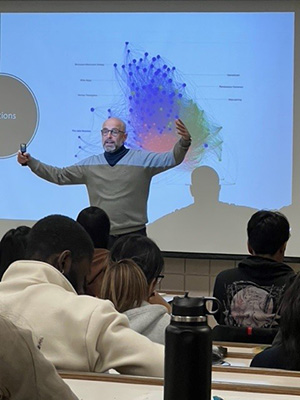 the crafting of the self. All the activities that we do in the courses, on different levels, from different perspectives are directed at [giving] students the skills to craft their own self,” he said. For Suárez, creativity is the most important skill to have “to be able to navigate and live with [constant] change. And creativity is the most important thing in the Humanities,” he added. His courses Digital Creativity and Creativity Studio, for instance, draw on literary and philosophical texts, performance art, films, cultural criticism and expose students to 11-12 creatives from different backgrounds, different disciplines. One of the aims, he says, is to show how each creative, in their own creative journey, solves problems.
the crafting of the self. All the activities that we do in the courses, on different levels, from different perspectives are directed at [giving] students the skills to craft their own self,” he said. For Suárez, creativity is the most important skill to have “to be able to navigate and live with [constant] change. And creativity is the most important thing in the Humanities,” he added. His courses Digital Creativity and Creativity Studio, for instance, draw on literary and philosophical texts, performance art, films, cultural criticism and expose students to 11-12 creatives from different backgrounds, different disciplines. One of the aims, he says, is to show how each creative, in their own creative journey, solves problems.
In his courses, instead of designing long lectures, Suárez designs what he calls “learning journeys” that enable students to develop their skills and access their selves “as a source of constant innovation” to be able to adapt to constant change: “professional skills are valuable for a short period of time, [but] they will need to learn nuance giving how fast things change... being able to have those resources for ambiguity, flexibility is going to be key for them in making a difference,” he added. In his Creativity Studio class, for instance, students design business plans that may be outside of their field of study. He asks students to do self-assessment to help them bring their skills to real life, to the needs of the field they want to work in. At the center of his approach, once again, lies creativity. Self-assessment and being creative become especially important for students who major in Humanities. “Becoming a university professor is not the only path that they can take. There are many opportunities, many ways in which people can live fulfilling lives doing what they love, [helping] people with their skills, working in culture,” he said. This holds true not only for students in Arts and Humanities, but also for students studying in science- or business- based disciplines. In fact, Suárez’s creativity-centered classes reel in many students from other programs such as BMOS, Medical Sciences, Nursing, and Engineering.
Reinventing the Humanities
Suárez has several graduate degrees that reflect his approach to interdisciplinary teaching. He holds Ph.D.s in Philosophy and Hispanic Studies, and Masters’ degree in Management of Information Systems and Digital Apps, in addition to a MBA.
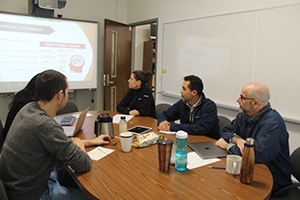 “Digital Humanities,” Suárez explained, “are the Humanities of the digital age, tools that come in digital forms that we can use -- [meaning] the content that has been digitized content or digitally produced.” Suárez believes that in the twenty-first century we need to develop the skills that we need to solve the problems that we have now. We need to “create new tools to solve those new problems and in [digital humanities] our tools are digital based tools,” he said. “In the CulturePlex, we are trying to reinvent the Humanities. Everything can’t stay the way it was ... We need to develop and expand the creativity of people who are with us,” he added. To that end, his CulturePlex lab also offers internship research experience opportunities for undergraduate students in the topics of AI, analysis of cultural networks and design to help expand their creativity. The lab also employs graduate student researchers from different programs in Arts and Humanities.
“Digital Humanities,” Suárez explained, “are the Humanities of the digital age, tools that come in digital forms that we can use -- [meaning] the content that has been digitized content or digitally produced.” Suárez believes that in the twenty-first century we need to develop the skills that we need to solve the problems that we have now. We need to “create new tools to solve those new problems and in [digital humanities] our tools are digital based tools,” he said. “In the CulturePlex, we are trying to reinvent the Humanities. Everything can’t stay the way it was ... We need to develop and expand the creativity of people who are with us,” he added. To that end, his CulturePlex lab also offers internship research experience opportunities for undergraduate students in the topics of AI, analysis of cultural networks and design to help expand their creativity. The lab also employs graduate student researchers from different programs in Arts and Humanities.
Tools to Solve Problems in the Twenty-First Century
Suárez was awarded the 2022 Hellmuth Prize for Achievement in Research for research excellence and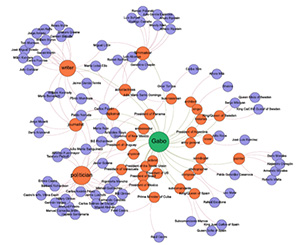 contributions to digital humanities. Throughout his career, as a digital humanist, Suárez has secured more than $4.3 million in research funding and his CulturePlex lab is recognized as the first-ever Canadian digital humanities lab to be funded through a Canada Foundation for Innovation grant. Over the last decade, CulturePlex collaborated with a diverse set of international partners in finance, cybersecurity, agriculture, and cultural management to examine to solve the challenges humankind faces in the 21st century. Recently, the lab has worked with a group of physicists in Argentina and Spain to analyze the complex networks of interactions among important figures of Italian Renaissance in Wikipedia, and completed a project for Central Bank of Columbia, helping them analyze their cultural networks.
contributions to digital humanities. Throughout his career, as a digital humanist, Suárez has secured more than $4.3 million in research funding and his CulturePlex lab is recognized as the first-ever Canadian digital humanities lab to be funded through a Canada Foundation for Innovation grant. Over the last decade, CulturePlex collaborated with a diverse set of international partners in finance, cybersecurity, agriculture, and cultural management to examine to solve the challenges humankind faces in the 21st century. Recently, the lab has worked with a group of physicists in Argentina and Spain to analyze the complex networks of interactions among important figures of Italian Renaissance in Wikipedia, and completed a project for Central Bank of Columbia, helping them analyze their cultural networks.
Most recently, Suárez’s research and teaching experience in the digital humanities over the last ten years came together in his new book La Condición Digital [The Digital Condition]. Published in Spain and currently only available in Spanish, the book offers a summary of his thoughts about the digital condition. “It explains what we are going through and thinks about [our digital condition] philosophically,” he said. “There is [also] a lot of criticism about the negative aspects of the digital condition,” he added.
Wherever we may land on the ChatGPT debate and the questions that surround the future of the Humanities departments, the only thing we know is that we will still be living in a digital age, in a land of the unknown, with a guarantee of more to come.
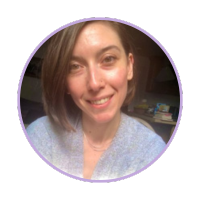 About our Contributor
About our Contributor
Busra Copuroglu is a Ph.D. candidate in Comparative Literature with a background in French Studies. Her current doctoral dissertation, in progress, is about literary depictions of boredom and complaint from the late nineteenth century to the present.
Connect with Busra  Twitter
Twitter  LinkedIn
LinkedIn




